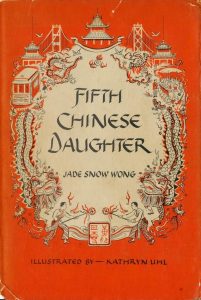
A first edition cover of Fifth Chinese Daughter with questionable font choice, Phot Credit: (https://web.archive.org/web/20230725170657/https://chimericaneyes.blogspot.com/2015/01/jade-snow-wongs-fifth-chinese-daughter.html)
Ann Laura Stoler described the shift in historical studies from “archive-as-source to archive as subject” as the “archival turn,” a shift in the intellectual paradigm necessitated, in part, by desires to write subaltern histories. Rather than reading archives along the grain, and in doing so, permitting them to speak the narratives they have been permitted to, scholars engage in “brushing history against the grain.” But, as Stoler compellingly argues, such resistance necessitates first understanding the epistemological knowledge the archive seeks to convey. Only through understanding the archive as a source can be begin to unravel the archive as a subject, and situate it within its broader epistemological context.
I had an experience with these intellectual practices that Stoler so aptly describes conducting research for my senior thesis. My project, broadly speaking, has been to historicize literary works by Chinese-Americans during the cultural Cold War, a period of heightened tension between America and China that was fought not only militarily in the Korean and Vietnma Wars, but also through arts and letters. As I read Fifth Chinese Daughter by Jade Snow Wong, one of my primary sources, I found it incredibly difficult to process. In recent years, the autobiography has been fiercely criticized for catering to a white, American audience, exoticizing the ‘Chinese experience,’ and perpetuating stereotypes of the Chinese population being meek and mild. I personally found her firm insistence on being apolitical while being sent on a speaking tour around Asia to promote her book extremely ridiculous or at the very least, incredibly myopic (if she was being genuine in her political inclinations). While speaking to my advisor, all I could articulate was how much I didn’t like the work.
That being said, while criticism is often interesting and can provide genuine insight, it can just as easily be counterproductive. In limiting myself to the ways her work failed, which has been well documented, my questions about how this work contributed to America’s Cold War cultural project and why it had such resonance (it was the best selling Chinese autobiography for decades) went unanswered. Rather than examining the stereotypes she perpetuated, I needed to focus on ideas about Chinese people she was pushing against, and how she envisioned a version of Chinese-American womanhood and personhood for a large minority population at the time. Reading along the archival grain, and historically contextualizing it so that her concerns became real to me, was an intellectual hurdle I needed to overcome.
This is an issue I’ve encountered in various projects. In one seminar, I chose to write a final paper on the history of the Vancouver housing crisis, an issue oft blamed on the city’s large Chinese population. As I combed through historical newspapers, I was frequently incensed by the racist undertones of coverage on Vancouver’s housing inaffordability. And yet the research showed clear ties between the influx of this specific demographic, city politics surrounding housing policy, and rising prices. This was a story about racism, but it was also one about bad property practices.
It seems obvious that historical artifacts and archives are not only useful when we like them and when they fit our modern sensibilities, but actually engaging with documents that espouse bigoted, unsavory ideas and narratives we know to be historically wrong seriously is harder to practice. The cardinal sin for those who attempt to write history is to judge them with what we know now, to view them as modern subjects when they are in fact historical ones. It is doubly difficult with literature because we don’t view them as works whose value comes from their historicization. And yet there may just be knowledge granted from post-modern interpretations of literary works as being by products of history and history makers in and of itself. Fifth Chinese Daughter is a certain example of this for me. In the end, in removing myself, a Chinese woman from the twenty first century, from the viewfinder as a subject whose emotional response matters, I was able to see more clearly what preoccupied and worried Wong.
